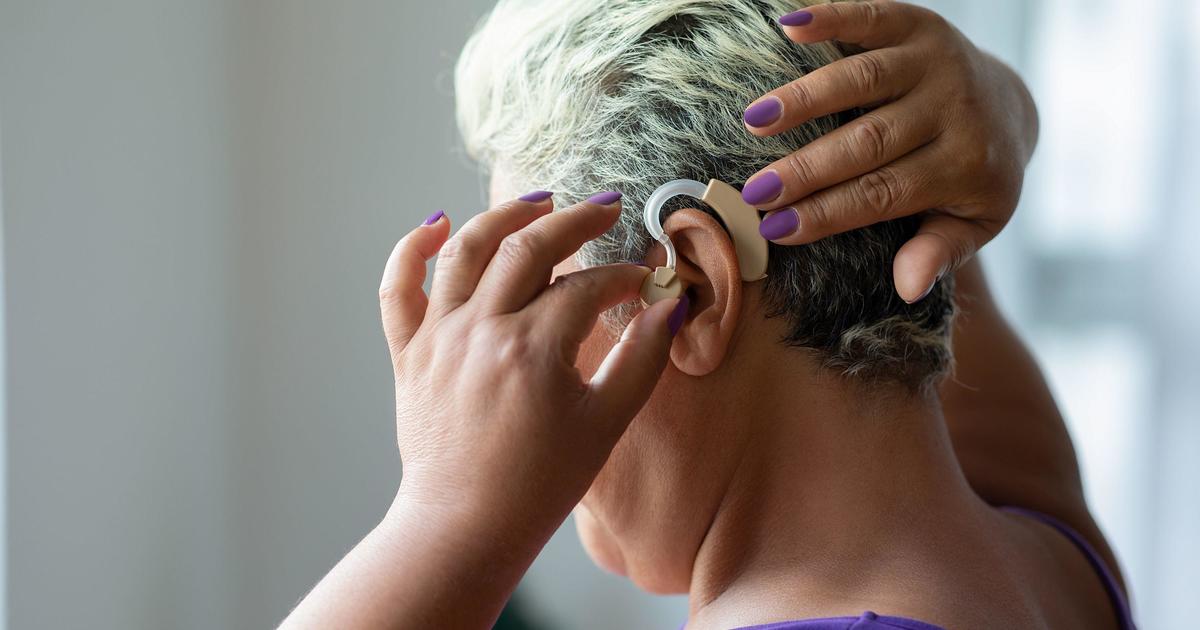MIAMI – For persons dealing with a greater risk of cognitive drop, acquiring hearing aids could cut your hazard in 50 percent, according to a new analyze.
Cognitive drop is a reduction in skills that can array from gentle impairment to dementia, in accordance to the US Centers for Disease Regulate and Avoidance, and dementia is a big problem across the globe.
“As everyone lives lengthier, the amount of men and women with dementia in excess of time are likely up,” stated co-principal investigator of the analyze Dr. Frank Lin, professor at Johns Hopkins College School of Drugs and the Bloomberg Faculty of Community Health and fitness.
In excess of the past decade, exploration has set up that hearing reduction is a single of the major possibility variables for establishing dementia, but it wasn’t apparent irrespective of whether intervening with listening to aids would decrease the possibility, he additional.
But the examine revealed Tuesday in the Lancet was the initial randomized management review to look into this issue, Lin claimed.
The scientists seemed at far more than 3,000 individuals from two populations: healthful community volunteers and more mature grown ups from the Atherosclerosis Chance in Communities (ARIC) examine, a longstanding observational research of cardiovascular health.
Members were being randomly assigned to both a command group that gained counselling in persistent sickness prevention or an intervention team that obtained treatment from an audiologist and listening to aids, according to the study. Scientists followed up with the groups each and every 6 months for 3 many years, and at the conclude, they were being supplied a score from a detailed neurocognitive take a look at.
In the total team, hearing aids did not look to reduce cognitive decline, the review reported. But when scientists seemed at just the older team that was at increased threat, they located a sizeable reduction in cognitive drop, Lin claimed.
“That was extremely spectacular to see that in the unhealthy individuals, they were able to sluggish the fee of cognitive drop by 48%,” stated Dr. Thomas Holland, a physician scientist at the Rush Institute for Wellbeing Ageing. Holland was not involved in the analyze.
The lesser adjust in excess of the whole inhabitants could be since if the healthful, fewer at-possibility contributors weren’t seeing cognitive drop substantially at all, then the hearing aids could not do much to slow it down, he extra.
“We can not gradual down a little something which is presently truly not transforming,” Lin explained.
But the inhabitants much more at hazard noticed costs of cognitive decline at stages practically a few situations increased than their counterparts, and the results get in touch with into query no matter if governments and men and women really should prioritize listening to wellbeing to reduce dementia danger, he additional.
Why listening to loss may perhaps enhance dementia hazard
Everyone’s listening to declines with age, Lin said. But why could possibly that maximize dementia danger?
There are three mechanisms researchers think may possibly be at play, he explained.
A person is that if the cochlea wears out over time, the interior ear may well be sending garbled indicators to the brain, which has to do the job more durable and redistribute mind energy to comprehend what it is really hearing, Lin reported.
“Which is why persons generally say it sounds like folks are mumbling at me,” he included.
Yet another is that hearing reduction might have structural impacts on the brain’s integrity, and sections may possibly be atrophying or shrinking quicker – and that is not fantastic for the brain, Lin reported.
The last possible system is that if you can not listen to pretty perfectly, you could be less most likely to go out and participate in social pursuits.
“We’ve extensive recognized that … remaining really engaged in frequently social routines is pretty crucial for keeping our cognitive wellness as nicely,” Lin stated.
What to do about it
First items first: If you usually are not guaranteed about your hearing wellbeing, get it checked, Lin claimed.
Even if you have only moderate listening to decline, use an aid, said Dr. Benjamin Tan, Dean’s Fellow at the Yong Loo Lin University of Drugs at the Countrywide University of Singapore. Tan was not associated in the new analyze.
“It is a simple, efficient and almost chance-cost-free approach to protect your cognition as much as achievable,” he included.
That said, not everybody in the United States has accessibility to regular consultation and therapy with an ear, nose and throat health care provider or an audiologist, Tan mentioned. In individuals situations, lessen value in excess of-the-counter listening to aids – out there without having a prescription – may well be a great possibility.
“Even although you will not have authorities diagnosing the induce of your listening to decline or fine-tuning your unit, it is in all probability nevertheless far better to use a hearing aid than none at all,” he claimed.
But the research also showed the relevance of keeping bodily wellbeing to protect against cognitive decline.
“What this examine is definitely telling us is that persons that do have those underlying comorbidities, or chance components for cognitive drop, need to have to be even far more diligent about performing all those once-a-year visits,” Holland said.
That implies examining in with a principal treatment supplier consistently, receiving frequent physical exercise prioritizing ingesting leafy greens, berries and omega-sort fatty acids having superior sleep and holding your brain sharp by discovering new issues, he added.
All those components are especially essential if you have listening to loss, atherosclerosis, high blood strain, heart disorder or neurovascular illness, Holland explained.
With cognitive drop and dementia, it is most powerful to get forward of the dilemma.
“Intervening before to possibly stop the sickness method completely or to support establish resilience in the confront of a condition system is ideal,” he included.



